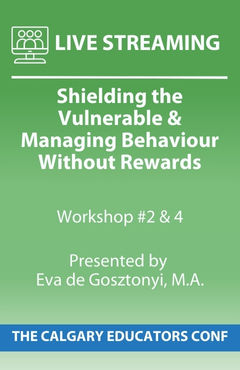Description
By purchasing this product you are registering to attend the conference/this workshop VIRTUALLY if you would like to attend in person please register at http://www.jackhirose.com/workshop/the-calgary-conference/
This workshop is part of The Calgary Conference on Behavioural, Emotional & Developmental Challenges with Children & Adolescents
This workshop will be live streaming to online participants on November 13, 2024 from 8:00am – 3:30pm (Calgary, AB)
Please adjust your start time according to your specific time zone.
Recorded footage and all course content (certificate, videos, quiz) will be available until December 16, 2024. Extensions cannot be granted under any circumstances.
Please allow 5 – 7 business days after the course airs for recorded footage to become available.
Registration will close on November 12, 2024.
WORKSHOP #2: Shielding the Vulnerable: How to Protect their Heart and Minds | PRESENTED BY Eva de Gosztonyi, M.A.
For those who spend their days interacting with the young, be it in schools, group homes, daycares and in our own homes, we sometimes forget how vulnerable they are. Developing beings are entirely dependent on the care of the more mature. Yet so many common practices that we use, especially when behaviour is challenging, increase feelings of separation and vulnerability and inadvertently lead to other unanticipated problems, including mental-health issues. This session will focus on creating a better understanding of what our children need from us and on analyzing the pitfalls of some of our most commonly used interventions and interactions, including the use of praise, rewards, consequences, time-outs, democratic or child-led practices, and self-regulation. The presentation will then provide alternatives to these, as well as encouraging adults to find ways to support children in the most important task of all, helping their emotions to move through.
WORKSHOP #4: Managing Behaviour Without Rewards | PRESENTED BY Eva de Gosztonyi, M.A.
When students have difficulty with their behaviours teachers are often advised to implement a reward system. However, developmental science and trauma research do not support these systems, warning of unwanted side-effects for children’s development. These systems are known to lose their effectiveness over time, are complicated to implement, and rarely result in long-term change. Of concern is that they can significantly affect the all-important child-adult attachment relationship, can increase anxiety even among the well-behaved, and can cause discouragement and a sense of shame for the student who cannot “do better” despite best intentions and a desire to earn rewards. This presentation will provide an analysis of what works and does not work, and why. Then effective alternatives to help manage behaviour in the classroom such as increasing the students’ desire to please their teacher, simple classroom alterations that can make behaving appropriately easier, and suggestions for how to respond when behaviour is challenging, will be described.





